|
|
|
Sort Order |
|
|
|
Items / Page
|
|
|
|
|
|
|
| Srl | Item |
| 1 |
ID:
189991
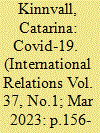

|
|
|
|
|
| Summary/Abstract |
This short article discusses how different fantasy narratives have come together during the Covid-19 crisis in various far-right movements, parties and audiences across the world and how much of these fantasies rely on racialised and gendered notions of a fantastical world-order in which particular forms of emotional governance provide a relief and sense of security to certain societal groups. This involves a close engagement with crisis and crisis narratives in relation to ontological insecurity and anxiety; how such crisis narratives have materialised in fantasies related to borders and corona nationalism, and the emotional governance of these particular fantasies in the hands of populist leaders and their increasingly receptive audiences.
|
|
|
|
|
|
|
|
|
|
|
|
|
|
|
|
| 2 |
ID:
114571
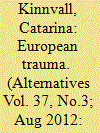

|
|
|
|
|
| Publication |
2012.
|
| Summary/Abstract |
This article examines the unfolding of traumas as structural and sociopsychological narratives focused on the bordering of identity and the governing of past present and future. Proceeding from a Lacanian conception of trauma and a Foucauldian understanding of governmentality, the analysis is centered on hegemonic counternarratives, even crises, involving the bordering of both Islam/Muslim identity and Europe/national identity. This "European trauma," or psychological moment, is exemplified through events in London 2005 and Norway 2011. It is perceived in terms of Chosen Traumas and Chosen Glories, the mythologization of past events that are retold, reinvented, and awarded new meanings in the present. Such traumas and glories can create a foundation for governing practices in which hegemonic interpretations of identity turn into normalizing narratives that justify violence. However, the governing of narratives is a contested process and alternative narrative understandings in terms of everyday practices can stimulate social resistance and psychological resilience, eventually challenging the normalizing bordering processes encountered in Europe today.
|
|
|
|
|
|
|
|
|
|
|
|
|
|
|
|
| 3 |
ID:
151181
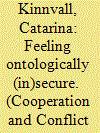

|
|
|
|
|
| Summary/Abstract |
This article proceeds from a conceptual analysis of how ontological (in)security is constructed in terms of ‘security-of-being’ in which identity dynamics are explicated in socio-psychological terms. Of particular interest is how such dynamics transcend the boundaries of individual self/other constructions to define communities and states, and how these dynamics are transformed in times of trauma and crises. Narratives of everyday traumas are especially significant in creating notions of gendered space and (in)security, and for securitising subjectivities. This article thus investigates a number of theoretical propositions and developments involved in recent debates on the emotional dimension of ontological (in)security and its relationship to states, traumas and the securitisation of subjectivity. A gendered perspective of these debates allows us to analyse, and perhaps move beyond, some of the problematic aspects of the ontological security literature as originally developed by Laing and Giddens, and later on by sociologists and international relations scholars. Using the case of India as an example, the article shows how narrative reconstructions of traumas and collective memory shape gendered space and the search for ontological security, and how attempts to govern these events and practices impact on notions of gendered space and ontological insecurity.
|
|
|
|
|
|
|
|
|
|
|
|
|
|
|
|
| 4 |
ID:
081810
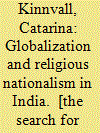

|
|
|
|
|
| Publication |
London, Routledge, 2006.
|
| Description |
xv, 222p.
|
| Series |
Routledge advances in international relations and global politics
|
| Standard Number |
9780415405478
|
|
|
|
|
|
|
|
|
|
|
|
Copies: C:1/I:0,R:0,Q:0
Circulation
| Accession# | Call# | Current Location | Status | Policy | Location |
| 053490 | 320.540954/KIN 053490 | Main | On Shelf | General | |
|
|
|
|
| 5 |
ID:
096284
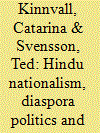

|
|
|
|
|
| Publication |
2010.
|
| Summary/Abstract |
This article proceeds from a critical reading of the role of religion for nation-building in India. In particular, the authors discuss how the Indian notion of secularism relies upon a number of religious legacies manifest in a Gandhian notion of what constitutes religious and political communities. Proceeding from this general picture, the authors examine how Hindu nationalists have used such legacies to enforce exclusionary practices by establishing certain hegemonic structures of rigid religious boundaries and practices with the aim of maintaining antagonistic movements within the Hindu fold. This, the authors argue, has been the case both among Hindu nationalists in India and among the widespread diaspora in Europe, Canada and the United States. Here, the authors critically evaluate a number of attempts to challenge these hegemonic structures in terms of secular and religious forces as well in terms of legalistic understandings of citizenship rights. It is argued that religion can and has played a positive role in Indian nation-building, but that Hindu nationalism has continuously reproduced exclusionary practices against other religious communities and worked against any forms of assimilatory processes.
|
|
|
|
|
|
|
|
|
|
|
|
|
|
|
|
| 6 |
ID:
160613
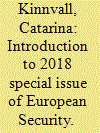

|
|
|
|
|
| Summary/Abstract |
The European Union (EU) faces many crises and risks to its security and existence. While few of them threaten the lives of EU citizens, they all create a sense of anxiety and insecurity about the future for many ordinary Europeans. Amongst these crises are the more obvious challenges of sovereign debt and fiscal austerity; refugees from conflicts in Afghanistan, Iraq, and Syria; and the rise of populist far-right parties across Europe. But behind these challenges lie less visible insecurities about economic prospects, social wellbeing, and a widespread expectation that the EU is unable to answer the challenges of twenty-first century global politics. In other words, the greatest security challenge facing people across Europe is not physical, despite the threats of Putin and ISIS, but is a sense of fear and anxiety over their daily lives.
|
|
|
|
|
|
|
|
|
|
|
|
|
|
|
|
| 7 |
ID:
151174
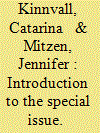

|
|
|
|
|
| Summary/Abstract |
The research community of ontological security scholars is vibrant and wide-ranging, defined by a conceptual core and by the themes through which scholars register their disagreements. In this special issue we have collected some of the work that has been produced or inspired by discussions and meetings during the last few years. The goal is to showcase some of the breadth of insights and possibilities on the topic of ontological securities and insecurities in world politics. Thus far, International Relations scholarship on ontological securities in world politics has been varied, focusing on different referent objects (individual, society, group, state), different political outcomes (cooperation, conflict, violence; stability or change) and different methods (quantitative, qualitative, discursive). While on the face of it such differences would seem to pose a challenge to the goal of developing a coherent research agenda, we have found the range of work and diversity among ontological security scholars to be exceptionally productive, leading already to cross-fertilisation and the deepening of our own approaches, while also inspiring new collaborations. The articles in this special issue discuss the subjective and foundational dimensions of ontological security in philosophical, existential and empirical terms and approach the ‘level-of-analysis’ problem from new perspectives.
|
|
|
|
|
|
|
|
|
|
|
|
|
|
|
|
| 8 |
ID:
162494
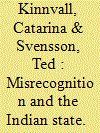

|
|
|
|
|
| Summary/Abstract |
A focus on misrecognition allows us to move between levels of analysis in a holistic fashion. If misrecognition works through the conscious and the unconscious we can account for the many overlapping insecurities and securities believed to exist at the individual, group, or state level – and thus felt. These insecurities also present themselves through the categories used to describe them and the policies through which they become materialised, technologised, and depoliticised, often by closing down discursive boundaries. Lacan’s concepts of desire, real and lack are here important for understanding the impossibility of recognising something that cannot be recognised. Hence, a perspective that takes misrecognition not as an end result or as failed attempts to reformulate the exceptional as the normal, has the potential to rethink the political subject. In empirical terms, the article discusses how this process of misrecognition has been shaped in the Indian context of postcolonial state formation and articulations of sovereignty. We show how the Indian state is being rethought, restructured, and reimagined through Hindu nationalism and how the concept of misrecognition accounts for desires for sovereign agency and group cohesiveness, but also for resistance to various reimaginations of the Indian state.
|
|
|
|
|
|
|
|
|
|
|
|
|
|
|
|
| 9 |
ID:
167599
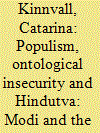

|
|
|
|
|
| Summary/Abstract |
In an era increasingly defined by insecurity and populist politics, India has emerged as a forceful ontological security provider under the leadership of Marendra Modi. If ontological security is about finding a safe (imagined) haven, then ontological insecurity is about the lack of such a space in narrative terms. Drawing on Lacanian understandings of ‘the imaginary’ as something that can fill and naturalize this lack of space, the article is concerned with how memories, places and symbols of narrative identity constructions are used in populist discourse. More specifically, it attempts to understand the relationship between ontological insecurity and the imaginaries of populist politics in India. In so doing, it argues that the re-invention of ‘nationhood’, ‘religion’ and ‘Hindu masculinity’ along gendered lines has created a foundation for governing practices aimed at ‘healing’ a number of ontological insecurities manifest in Indian society. It specifically looks at how the Modi doctrine has formulated and expanded its foreign policy discourse into one that privileges populist narratives of nativism, nationalism and religion as forms of ontological security provision at home and abroad, but also how everyday practices can challenge such narratives, thus allowing different imaginaries of the Indian state.
|
|
|
|
|
|
|
|
|
|
|
|
|
|
|
|
| 10 |
ID:
096853


|
|
|
|
|
| Publication |
2009.
|
| Summary/Abstract |
In this article, we call into question the assumptions that undergird conceptions of boundary, territory, community and ethno-cultural belonging in the constitution of European security. Both the term 'human security' as defined by development and human rights scholars and 'securitisation' as conceptualised by critical security studies concern the socio-psychological aspects of security. Yet, few attempts have been made to seriously discuss the psychological effects of securitisation on subjectivity and space. There is, as we will argue, a tendency in much literature to use concepts of 'existential security', 'fear', 'needs' and the 'politics of belonging' - obviously connected to the human mind and individual emotionality - without much space being devoted to the investigation of these concepts in terms of socio-psychological processes. We intend to fill this gap by discussing security and securitisation in terms of the psychology of subjectivity and space among young Muslims in Europe. Our principal argument is that through openness to the political psychology of subjectivity and space, and the (de)securitisation of both, we are able to develop more adequate maps of the European experience of danger and opportunity.
|
|
|
|
|
|
|
|
|
|
|
|
|
|
|
|
|
|
|
|
|